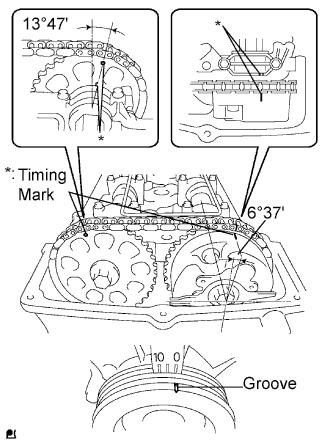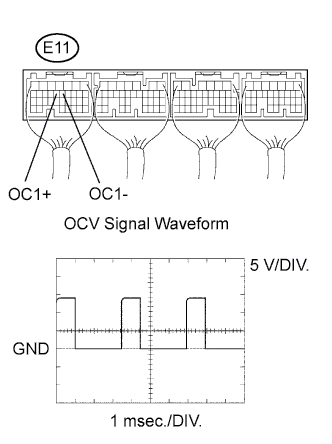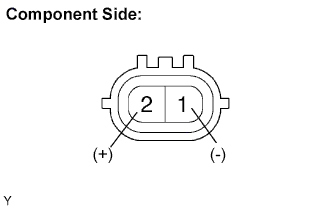DESCRIPTION
MONITOR DESCRIPTION
WIRING DIAGRAM
INSPECTION PROCEDURE
When using intelligent tester:
PERFORM ACTIVE TEST (OPERATE OCV)
CHECK IF DTC OUTPUT RECURS (DTC P0011/59 OR P0012/59)
CHECK VALVE TIMING
CHECK ECM (OCV SIGNAL)
CHECK OIL CONTROL VALVE FILTER
INSPECT CAMSHAFT TIMING OIL CONTROL VALVE ASSEMBLY (OCV)
REPLACE CAMSHAFT TIMING CONTROL VALVE ASSEMBLY (OCV)
CHECK CAMSHAFT TIMING GEAR ASSEMBLY
REPLACE CAMSHAFT TIMING GEAR ASSEMBLY
CHECK FOR BLOCKAGE (OCV, OIL CHECK VALVE, OIL HOLE)
CHECK IF DTC OUTPUT RECURS (DTC P0011/59 OR P0012/59)
When not using intelligent tester:
CHECK VALVE TIMING
CHECK ENGINE SPEED (OPERATION OF OCV)
CHECK IF DTC OUTPUT RECURS (DTC P0011/59 OR P0012/59)
CHECK ECM (OCV SIGNAL)
CHECK OIL CONTROL VALVE FILTER
CHECK CAMSHAFT TIMING OIL CONTROL VALVE ASSEMBLY (OCV)
REPLACE CAMSHAFT TIMING OIL CONTROL VALVE ASSEMBLY (OCV)
CHECK CAMSHAFT TIMING GEAR ASSEMBLY
REPLACE CAMSHAFT TIMING GEAR ASSEMBLY
CHECK FOR BLOCKAGE (OCV, OIL CHECK VALVE, OIL HOLE)
CHECK IF DTC OUTPUT RECURS (DTC P0011/59 OR P0012/59)
DTC P0011/59 Camshaft Position "A" - Timing Over-Advanced or System Performance (Bank 1) |
DTC P0012/59 Camshaft Position "A" - Timing Over-Retarded (Bank 1) |
DESCRIPTION
Refer to DTC P0010/39 (Toyota Fortuner RM000000ZQJ006X_01.html).DTC No.
| DTC Detection Condition
| Trouble Area
|
P0011/59
| Advanced cam timing:
After engine is warmed up, valve timing does not change from current valve timing while driving at engine speed of 500 to 4,000 rpm (1 trip detection logic)
| - Valve timing
- OCV
- OCV filter
- Camshaft timing gear assembly
- ECM
|
P0012/59
| Retarded cam timing:
After engine is warmed up, valve timing does not change from current valve timing while driving at engine speed of 500 to 4,000 rpm (2 trip detection logic)
| - Valve timing
- OCV
- OCV filter
- Camshaft timing gear assembly
- ECM
|
MONITOR DESCRIPTION
The ECM optimizes the valve timing using the VVT system to control the intake valve camshaft. The VVT system includes the ECM, OCV and VVT actuator. The ECM sends a target "duty-cycle" control signal to the OCV. This control signal, applied to the OCV, regulates the oil pressure supplied to the VVT controller. The VVT controller can advance or retard the intake valve camshaft.Example:A DTC will set if: 1) the difference between the target and actual valve timing is more than 5° of the Crankshaft Angle (CA) and the condition continues for more than 5 seconds; or 2) the OCV is forcibly activated 63 times or more.DTC P0011/59 (advanced cam timing) is subject to 1 trip detection logic.DTC P0012/59 (retarded cam timing) is subject to 2 trip detection logic.The monitor runs if all the conditions below are met:- After warming up engine (engine coolant temperature 80°C (176°F) or more).
- After driving the vehicle over 40 km/h (25 mph) for 3 minutes.
- After idling the engine for 3 minutes.
WIRING DIAGRAM
Refer to DTC P0010/39 (Toyota Fortuner RM000000ZQJ006X_03.html).
INSPECTION PROCEDURE
- HINT:
Malfunction
| DTC
|
Advanced timing over
(valve timing is out of specified range)
| P0011/59
|
Retarded timing over
(valve timing is out of specified range)
| P0012/59
|
- If DTC P0011/59 or P0012/59 is present, check the VVT system circuit.
- Read freeze frame data using the intelligent tester. Freeze frame data records the engine conditions when malfunctions are detected. When troubleshooting, freeze frame data can help determine if the vehicle was running or stopped, if the engine was warmed up or not, if the air-fuel ratio was lean or rich, and other data from the time the malfunction occurred.
- NOTICE:
- DTC P0011/59 or P0012/59 is output when a foreign object in the engine oil enters the system. These codes will stay even if the system returns to normal after a short time. Foreign objects are filtered out by the oil filter.
When using intelligent tester:
| 1.PERFORM ACTIVE TEST (OPERATE OCV) |
Start and warm up the engine.
Turn the ignition switch OFF.
Connect the intelligent tester to the DLC3.
Turn the ignition switch ON and turn the intelligent tester ON.
Enter the following menus: Powertrain / Engine and ECT / Active Test / Activate the VVT System (Bank 1).
Using the intelligent tester, operate the OCV and check the engine speed.
- OK:
Tester Operation
| Specified Condition
|
OCV is OFF
| Normal engine speed
|
OCV is ON
| Rough idle or engine stall
|
| 2.CHECK IF DTC OUTPUT RECURS (DTC P0011/59 OR P0012/59) |
Clear the DTCs using the intelligent tester (Toyota Fortuner RM000000ZPW017X.html).
Start the engine and warm it up.
Drive the vehicle for 10 minutes or more.
Read output DTC using the intelligent tester.
- OK:
- No DTC output.
Remove the cylinder head cover.
Turn the crankshaft to align the timing marks of the crankshaft.
Align the groove of the crankshaft pulley with the "0" position.
Confirm whether the timing marks of the camshaft pulley and cylinder head cover are facing each other.
If the timing marks are not facing each other, turn the crankshaft clockwise by 360°. Confirm again if the timing marks are facing each other.
- OK:
- The timing marks of the camshaft pulley and the cylinder head cover face each other when the groove of the crankshaft pulley is in the "0" position.
While idling, check the waveform of the ECM connector using an oscilloscope.
- OK:
Tester Connection
| Specified Condition
|
E11-13 (OC1+) - E11-12 (OC1-)
| Correct waveform is as shown
|
Tool Setting
| Condition
|
5 V/DIV., 1 msec./DIV
| Accelerate slowly after engine warm-up
|
| 5.CHECK OIL CONTROL VALVE FILTER |
Remove the OCV filter.
Check that the filter is not clogged.
- OK:
- The filter is not clogged.
| | REPLACE OIL CONTROL VALVE FILTER |
|
|
| 6.INSPECT CAMSHAFT TIMING OIL CONTROL VALVE ASSEMBLY (OCV) |
Measure the resistance between the terminals of the OCV.
- Standard resistance:
- 6.9 to 7.9 Ω at 20°C (68°F)
Remove the OCV.
Apply positive (+) battery voltage to terminal 2 and negative (-) battery voltage to terminal 1. Check the valve operation.
- OK:
- The valve moves quickly.
| 7.REPLACE CAMSHAFT TIMING CONTROL VALVE ASSEMBLY (OCV) |
| 8.CHECK CAMSHAFT TIMING GEAR ASSEMBLY |
- OK:
- The camshaft timing gear rotates smoothly when applying pressure.
| 9.REPLACE CAMSHAFT TIMING GEAR ASSEMBLY |
| 10.CHECK FOR BLOCKAGE (OCV, OIL CHECK VALVE, OIL HOLE) |
- OK:
- No blockage.
| 11.CHECK IF DTC OUTPUT RECURS (DTC P0011/59 OR P0012/59) |
Clear the DTCs using the intelligent tester (Toyota Fortuner RM000000ZPW017X.html).
Start the engine and warm it up.
Drive the vehicle for 10 minutes or more.
Read output DTC using the intelligent tester.
- OK:
- No DTC output.
When not using intelligent tester:
- NOTICE:
- DTC P0011/59 or P0012/59 is output when a foreign object in the engine oil enters the system. These codes will stay even if the system returns to normal after a short time. Foreign objects are filtered out by the oil filter.
Remove the cylinder head cover.
Turn the crankshaft to align the timing marks of the crankshaft.
Align the groove of the crankshaft pulley with the "0" position.
Confirm whether the timing marks of the camshaft pulley and cylinder head cover are facing each other.
If the timing marks are not facing each other, turn the crankshaft clockwise by 360°. Confirm again if the timing marks are facing each other.
- OK:
- The timing marks of the camshaft pulley and the cylinder head cover face each other when the groove of the crankshaft pulley is in the "0" position.
| 2.CHECK ENGINE SPEED (OPERATION OF OCV) |
Start the engine.
Check the engine speed.
Disconnect the C2 OCV connector. Check the engine speed.
- OK:
- Normal
Apply positive (+) battery voltage between the terminals of the OCV. Check the engine speed.
- OK:
- Rough idle or engine stalls
If both results above are as specified, proceed to A. If either or both results are not as specified, proceed to B.
| 3.CHECK IF DTC OUTPUT RECURS (DTC P0011/59 OR P0012/59) |
Clear the DTCs.
Disconnect the battery cable or remove the EFI and ETCS fuses for more than 60 seconds.
Start the engine and warm it up.
Drive the vehicle for 10 minutes or more.
Read output DTC.
- OK:
- No DTC output.
While idling, check the waveform of the ECM connector using an oscilloscope.
- OK:
Tester Connection
| Specified Condition
|
E11-13 (OC1+) - E11-12 (OC1-)
| Correct waveform is as shown
|
Tool Setting
| Condition
|
5 V/DIV., 1 msec./DIV.
| Accelerate slowly after engine warm-up
|
| 5.CHECK OIL CONTROL VALVE FILTER |
Remove the OCV filter.
Check that the filter is not clogged.
- OK:
- The filter is not clogged.
| | REPLACE OIL CONTROL VALVE FILTER |
|
|
| 6.CHECK CAMSHAFT TIMING OIL CONTROL VALVE ASSEMBLY (OCV) |
Measure the resistance between the terminals of the OCV.
- Standard resistance:
- 6.9 to 7.9 Ω at 20°C (68°F)
Remove the OCV.
Apply positive (+) battery voltage to terminal 2 and negative (-) battery voltage to terminal 1. Check the valve operation.
- OK:
- The valve moves quickly.
| 7.REPLACE CAMSHAFT TIMING OIL CONTROL VALVE ASSEMBLY (OCV) |
| 8.CHECK CAMSHAFT TIMING GEAR ASSEMBLY |
- OK:
- The camshaft timing gear rotates smoothly when applying pressure.
| 9.REPLACE CAMSHAFT TIMING GEAR ASSEMBLY |
| 10.CHECK FOR BLOCKAGE (OCV, OIL CHECK VALVE, OIL HOLE) |
- OK:
- No blockage.
| 11.CHECK IF DTC OUTPUT RECURS (DTC P0011/59 OR P0012/59) |
Clear the DTCs.
Disconnect the battery cable or remove the EFI and ETCS fuses for more than 60 seconds.
Start and warm up the engine.
Drive the vehicle for 10 minutes or more.
Read output DTC.
- OK:
- No DTC output.








